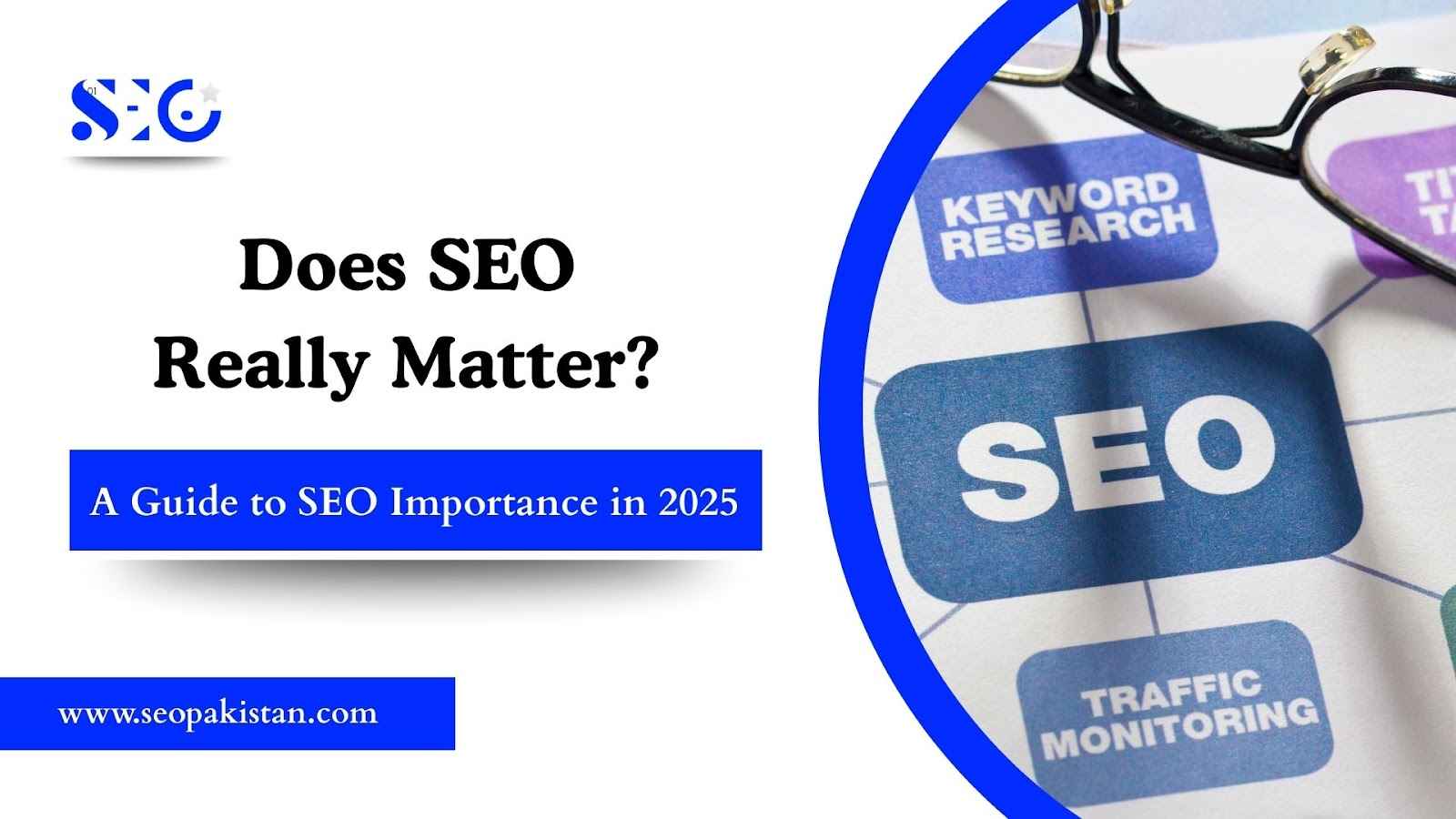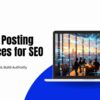Imagine this: You’ve just wrapped up a successful campaign on a popular social media platform, only to wake up the next day and find that a brand-new platform has taken the internet by storm.
Meanwhile, your advertising budget is stretched thin as costs keep climbing, and every marketing tool you explore promises game-changing AI solutions to solve all your problems.
This is the reality of digital marketing today, a constantly shifting landscape where staying ahead means adapting quickly to new platforms, rising costs, and evolving technology. Business owners find themselves asking a critical question: Is investing in SEO still worthwhile?
The answer is unequivocal: Yes. SEO importance has never been greater.
Far from becoming obsolete, search engine optimization remains the cornerstone of successful digital marketing strategies. It’s not just about climbing search rankings anymore; it’s about building unshakeable authority, earning customer trust, and creating sustainable growth that compounds over time.
This guide will reveal why SEO is the backbone of business success and how it seamlessly integrates with today’s top marketing channels. Learn why forward-thinking companies prioritize SEO over short-term fixes and how it delivers unmatched long-term value.
The Undeniable SEO Importance for Your Business’s Growth
Understanding SEO’s true value requires looking beyond simple keyword rankings. Modern SEO builds comprehensive business authority while delivering measurable results across multiple dimensions.
Increases Organic Traffic & Visibility
- Most people rely on search engines to discover information, products, and services on the internet.
- Over 68% of all online activities start with a search engine query.
- This high search volume represents billions of potential customers actively seeking solutions.
- Ranking highly for relevant searches drives qualified traffic to your website.
- Organic search visitors come with a genuine intent to engage, purchase, or convert.
- Intent-driven traffic from search engines outperforms other channels in both conversion rates and customer lifetime value.
Builds Trust and Credibility
High search rankings signal authority and trustworthiness to potential customers. Users inherently trust organic results more than paid advertisements, viewing top-ranking websites as industry leaders and credible sources.
- It is now a key component of modern SEO, with search engines prioritizing creators who showcase real expertise and experience.
- E-E-A-T builds trust beyond search rankings, influencing how customers perceive your brand.
- A strong organic presence signals credibility and validates your business’s legitimacy and market position.
Improves User Experience (UX)
Technical SEO improves usability and performance:
- Faster page loading speeds enhance user satisfaction.
- Mobile-responsive designs ensure accessibility across devices.
- Easy-to-use navigation helps visitors browse your website effortlessly
Improved user experience boosts engagement:
- Longer site visits and lower bounce rates are key outcomes of better UX.
- Higher engagement metrics signal quality to search engines, improving rankings..
Stats:
- Websites that load in under 2 seconds see a 15% higher conversion rate.
- Mobile-friendly sites rank 88% better in Google search results.
- A well-designed UX can increase user retention rates by up to 30%.
Sustainable, Long-Term Results
SEO investments compound over time, creating lasting value that continues generating returns long after initial implementation. Unlike paid advertising campaigns, which stop delivering traffic as soon as budgets run out, well-optimized content retains its ranking power.
In fact, 70% of marketers say SEO delivers better long-term ROI compared to PPC, according to HubSpot.
The initial investment in optimization pays dividends through consistent organic traffic, reduced reliance on paid channels, and improved overall digital marketing efficiency.
SEO as the Foundation of a Modern Digital Marketing Strategy
Effective SEO doesn’t operate in isolation; it amplifies and strengthens every other marketing channel. Smart businesses leverage SEO as their digital marketing foundation, using its insights and benefits to enhance all promotional efforts.
Complements Content Marketing
SEO research helps identify audience needs by revealing what your target audience is searching for and providing insights into their questions, problems, and interests. This information plays a key role in shaping effective content strategies.
Keyword analysis further drives the direction of your content by uncovering high-demand topics, ensuring that what you create aligns with audience demand.
Content and SEO work hand-in-hand
- SEO helps content deliver value to readers while improving search visibility.
- Optimized content drives consistent traffic growth, supporting business goals.
How SEO complements content marketing:
- Guides content creation by prioritizing audience-relevant topics.
- Increases organic reach, ensuring your content attracts the right audience.
- Balances value for readers with measurable marketing outcomes.
- Drives long-term traffic to amplify the impact of your content strategy.
Boosts Paid Advertising (PPC)
On-page SEO improvements directly enhance paid advertising performance. Fast-loading landing pages, relevant content, and positive user experience signals increase Quality Scores in Google Ads, reducing cost-per-click and improving ad positioning.
Identify High-Performing Keywords
- Organic keyword data reveals which search terms bring in the most traffic and conversions.
- Example: If “eco-friendly shoes” drives significant organic traffic, you can target this keyword in your PPC campaigns to attract a broader audience.
Reduce Wasted Ad Spend
- Focus on keywords that already perform well organically to avoid spending on low-impact terms.
- Example: Rather than targeting broad terms like “shoes,” prioritize specific, high-performing keywords such as “eco-friendly sneakers.”
Improve Targeting Precision
- Organic insights help refine audience targeting, ensuring your ads reach users with higher intent to convert.
- Example: If analytics show that users searching “vegan leather boots” convert frequently, you can create ad content that directly appeals to this audience.
Boost SERP Dominance
- Combining organic visibility with well-placed ads increases your brand’s presence on search engine results pages (SERPs).
- Example: If you already rank organically for “minimalist running shoes,” adding PPC ads ensures your brand appears both in paid and organic spots, making it harder for competitors to capture clicks.
By leveraging organic keyword insights, you create a more strategic PPC campaign that maximizes impact while minimizing waste.
Enhances Social Media Reach
SEO-optimized content performs better across social media platforms: search-friendly headlines, compelling meta descriptions, and valuable content increase sharing likelihood and engagement rates.
- Improved Content Discoverability: SEO-optimized content ranks higher in search engines, driving more traffic to your social media profiles and posts.
- Increased Social Shares: High-ranking and relevant content is more likely to be shared across social media platforms, expanding its reach.
- Enhanced Engagement: Search-optimized content attracts the right audience, leading to more meaningful interactions on social media.
- Stronger Brand Visibility: Combining SEO and social media efforts ensures your content appears in more places, increasing brand awareness.
- Cross-Platform Traffic Growth: Social media users who find your content via search are likely to explore and engage with your social channels.
- Reinforced Authority: Quality, SEO-driven content shared on social media strengthens your credibility and increases trust among your audience.
SEO vs. Paid Ads: An Investment vs. an Expense
The debate between SEO and paid advertising misses the fundamental difference between these approaches. They serve complementary roles in comprehensive digital marketing strategies, each offering distinct advantages for different business objectives.
| Feature | Search Engine Optimization (SEO) | Paid Advertising (PPC) |
| Cost | Long-term investment; no per-click cost | Continuous expense; per-click or per-impression cost |
| Speed | Results are gradual; it can take 3-6 months | Immediate results and instant traffic |
| Sustainability | Results are durable; traffic continues after the investment | Traffic disappears the moment your ad spend runs out. |
| Trust | Higher user trust; seen as an authoritative, organic result | Less trusted by users |
| ROI | High long-term ROI; value compounds over time | High short-term ROI |
This comparison reveals why successful businesses invest in both channels strategically. The most effective approach combines SEO’s foundational strength with PPC’s tactical flexibility, creating comprehensive search marketing strategies that dominate both organic and paid results.
SEO in an AI-Driven World
Artificial intelligence is transforming the search landscape, and instead of reducing the significance of SEO as some predicted, it is actually enhancing its value. Understanding these changes helps businesses prepare for the evolving search environment.
AI Won’t Replace SEO, It Will Transform It
AI content generation increases the volume of available information exponentially. This abundance makes SEO even more critical for distinguishing authoritative sources from generic AI-generated content.
- Search engines prioritize content with genuine expertise, first-hand experience, and unique perspectives, qualities AI alone cannot fully replicate.
- Industries like finance, healthcare, and legal services require highly specialized, accurate information often based on personal expertise or professional certifications.
- Example: A financial advisor’s blog offering tailored investment advice or a healthcare provider’s guide to specific treatments adds credibility and depth that AI struggles to match.
- Google’s Search Generative Experience (SGE) and similar AI-powered tools depend on authoritative, well-optimized websites as their sources.
- Example: AI summarizes information from trusted websites, such as detailed travel guides or expert-written product reviews.
- Businesses with strong SEO ensure their content is featured in AI-powered search results.
Voice and Visual Search
Voice search optimization requires different strategies than traditional text-based queries: conversational keywords, local optimization, and featured snippet targeting become increasingly important as voice assistants gain popularity.
Visual search through image recognition technology opens new optimization opportunities. Proper image tagging, descriptive file names, and relevant surrounding content help capture visual search traffic.
These emerging search methods expand SEO’s scope while reinforcing its fundamental importance in helping content get discovered across all search formats.
Conclusion
The evidence overwhelmingly highlights SEO’s Importance as a crucial business investment. Its unique blend of sustainability, trust-building, and integration capabilities makes it essential in modern digital marketing.
SEO provides the foundation that amplifies every other marketing channel’s effectiveness. It builds lasting competitive advantages that compound over time, creating business assets that continue generating value long after initial investments.
As search technology evolves and competition intensifies, businesses with strong SEO fundamentals will maintain significant advantages over competitors relying solely on paid channels or AI-generated content.
Start treating SEO as the non-negotiable foundation of your digital marketing strategy, and watch your sustainable growth accelerate beyond what paid advertising alone could ever achieve. Visit SEO Pakistan today and let us help you dominate the search rankings!
Frequently Asked Questions
How long does it take to see results from SEO?
SEO is a long-term process. Most businesses begin to see noticeable changes in traffic and rankings within 3 to 6 months, but significant and sustained growth typically takes 6 to 12 months as your efforts compound.
Is it better to invest in SEO or paid advertising (PPC)?
Neither is inherently better; they serve different purposes. PPC provides immediate, short-term traffic and can be used for rapid growth, while SEO is a long-term investment that builds authority and provides sustainable, compounding traffic over time without a per-click cost.
How much does SEO typically cost for a business?
The price of SEO can differ significantly based on the project’s scale, the business’s size, and the service provider. On average, a comprehensive SEO project for a small to medium-sized business can range from $1,500 to $5,000 per month.
Can an SEO audit guarantee rankings?
No, an SEO audit cannot guarantee a #1 ranking. It provides a strategic roadmap to improve your website’s performance and increase its chances of ranking higher, but many external factors, including your competition, influence search engine results.
Will AI replace the need for SEO?
No, AI will not replace SEO; it will transform it. As AI generates more content, SEO becomes more important for distinguishing authoritative, human-generated content. AI-powered search engines still rely on well-optimized websites as their sources for information.













